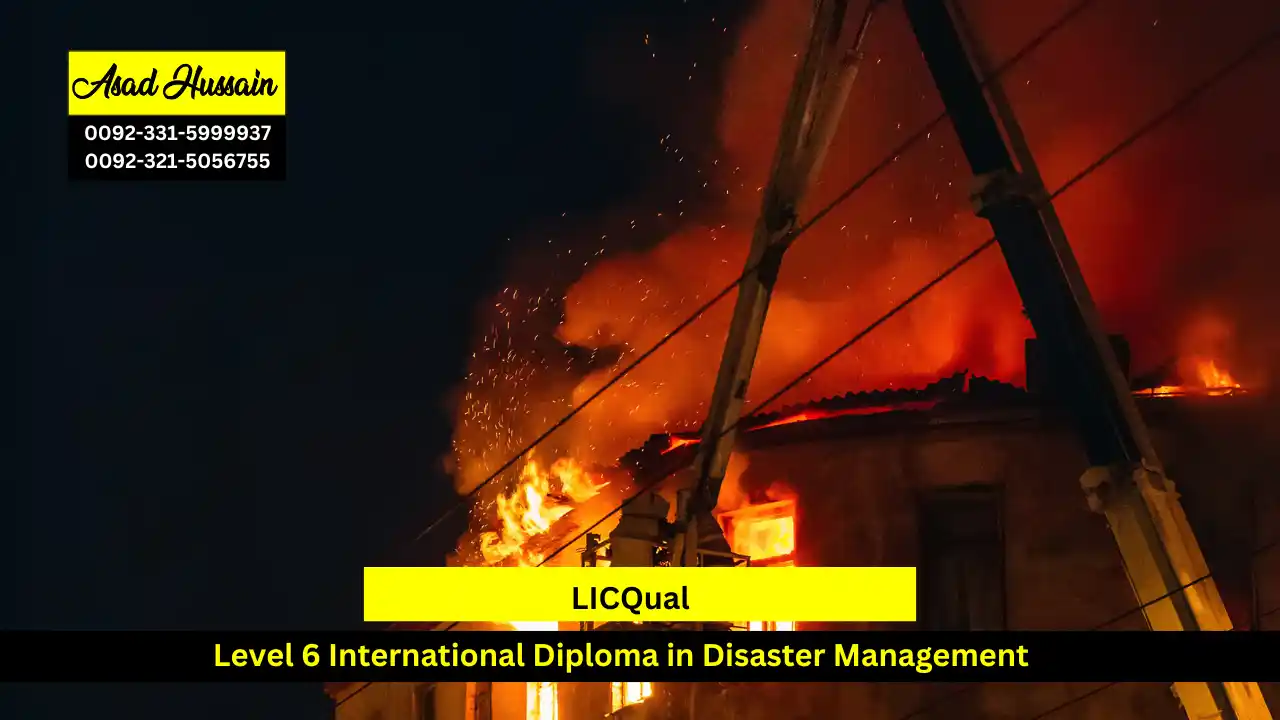In an increasingly unpredictable world, the demand for skilled professionals who can effectively manage disasters has never been higher. The Level 6 International Diploma in Disaster Management is designed to equip individuals with the knowledge and skills needed to prepare for, respond to, and recover from various types of disasters. This comprehensive program delves into the intricacies of disaster management, ensuring that graduates are well-prepared to handle crises on a global scale.
Disaster management encompasses a broad spectrum of activities aimed at minimizing the impact of disasters, whether natural or man-made. This includes everything from risk assessment and mitigation strategies to emergency response and recovery efforts. The goal is to reduce vulnerability and enhance the resilience of communities, infrastructure, and ecosystems.
The Level 6 International Diploma in Disaster Management is an essential program for those looking to make a significant impact in the field of disaster management. By equipping professionals with the necessary skills and knowledge, this diploma ensures that communities are better prepared to face the challenges of disasters and can recover more effectively. For anyone passionate about making a difference and building a safer, more resilient world, this diploma offers the perfect pathway to a rewarding and impactful career.
Program Highlights
Mandatory Units
- Unit 1. Management of Natural Hazards
- Unit 2. Forecasting, Monitoring & Early warning in Disaster Management
- Unit 3. Research Design and Methodology in Disaster Management
- Unit 4. Community Innovation and Disasters
- Unit 5. Decision making in Disaster Management
- Unit 6. Crisis Management in the Twenty-First Century: “Unthinkable”
Events in “Inconceivable” Contexts
Academic Qualifications
- Previous Education:
- Applicants should have completed a Level 5 qualification (or equivalent) in a related field such as Disaster Management, Emergency Planning, Environmental Science, Public Health, or any other relevant discipline.
- Alternatively, a bachelor’s degree in a relevant subject may also be considered.
- Transcripts and Certificates:
- Submission of official transcripts and certificates from previous educational institutions is required to verify academic qualifications.
Professional Experience
- Work Experience:
- A minimum of two years of professional experience in disaster management, emergency response, risk assessment, or a related field is highly recommended.
- Applicants with substantial work experience but without the required academic qualifications may still be considered on a case-by-case basis.
- References:
- Applicants should provide two professional references from supervisors or colleagues who can attest to their experience and competencies in disaster management or related fields.
Language Proficiency
- English Language Requirements:
- For non-native English speakers, proof of English language proficiency is required. This can be demonstrated through standardized tests such as IELTS (minimum score of 6.5), TOEFL (minimum score of 90), or equivalent.
- Alternatively, evidence of previous education or work experience in an English-speaking environment may also be accepted.
Personal Statement
- Motivation and Goals:
- A personal statement (500-700 words) outlining the applicant’s motivation for pursuing the diploma, career goals, and how the course aligns with their professional aspirations.
- The personal statement should also highlight any relevant experiences and skills that make the applicant a suitable candidate for the program.
Management of Natural Hazards
- Understand the various types of natural hazards, their causes, and their impacts on communities and environments.
- Analyze the vulnerability and risk factors associated with different natural hazards.
- Develop and implement strategies for the effective management and mitigation of natural hazards.
- Evaluate case studies of natural hazard management to identify best practices and lessons learned.
- Communicate the importance of natural hazard management to stakeholders, including policymakers and the public.
Forecasting, Monitoring & Early Warning in Disaster Management
- Explain the principles and techniques of disaster forecasting and monitoring.
- Assess the technologies and systems used for early warning of disasters.
- Design and implement effective early warning systems tailored to specific hazards and contexts.
- Analyze the challenges and limitations of forecasting and early warning systems.
- Enhance community preparedness and response through effective communication of early warnings.
Research Design and Methodology in Disaster Management
- Develop a comprehensive understanding of research methodologies applicable to disaster management.
- Design and conduct research projects aimed at addressing key issues in disaster management.
- Critically analyze data and research findings to inform disaster management practices and policies.
- Apply ethical considerations in disaster management research.
- Present research findings effectively to both academic and practitioner audiences.
Community Innovation and Disasters
- Explore the role of community innovation in enhancing disaster resilience.
- Identify and analyze examples of community-led initiatives and innovations in disaster management.
- Develop strategies to foster community participation and innovation in disaster preparedness and response.
- Evaluate the effectiveness of community-based disaster management programs.
- Advocate for policies and practices that support community innovation in disaster management.
Decision Making in Disaster Management
- Understand the decision-making processes and frameworks used in disaster management.
- Analyze the factors influencing decision-making during different phases of a disaster.
- Develop skills to make informed and effective decisions under conditions of uncertainty and stress.
- Evaluate the impact of decisions on disaster response and recovery efforts.
- Enhance collaborative decision-making processes involving multiple stakeholders.
Crisis Management in the Twenty-First Century: “Unthinkable” Events in “Inconceivable” Contexts
- Understand the nature and characteristics of crisis events in contemporary contexts.
- Analyze the challenges posed by “unthinkable” events and “inconceivable” contexts.
- Develop strategies for effective crisis management in complex and unpredictable scenarios.
- Evaluate case studies of recent crisis events to identify key lessons and best practices.
- Enhance resilience and adaptability in crisis management through innovative approaches and solutions.
The Level 6 International Diploma in Disaster Management is designed for professionals and aspiring leaders who are passionate about making a difference in the field of disaster management. This course is ideal for emergency responders, humanitarian aid workers, policy advisors, risk analysts, and public health officials who seek to deepen their expertise and enhance their ability to manage disasters effectively. It also caters to individuals working in government agencies, non-governmental organizations, international bodies, and private sector companies that focus on disaster preparedness, response, and recovery. Additionally, those with a background in environmental science, public health, urban planning, or related fields will find this diploma instrumental in advancing their careers and contributing to building resilient communities and systems.







